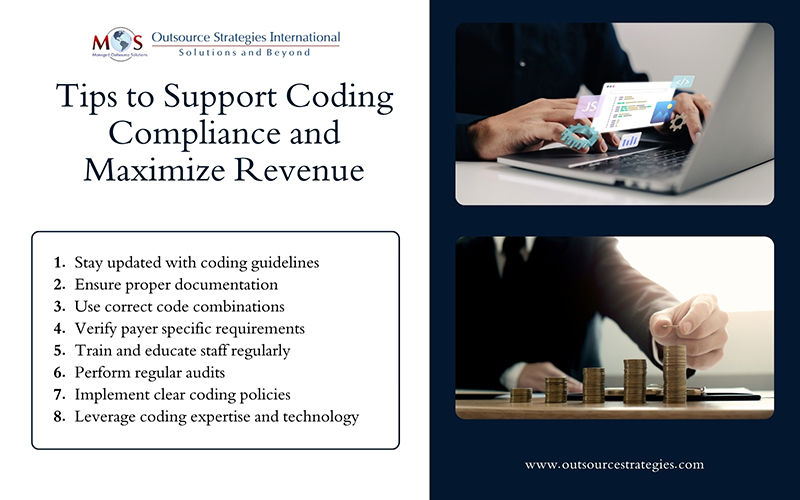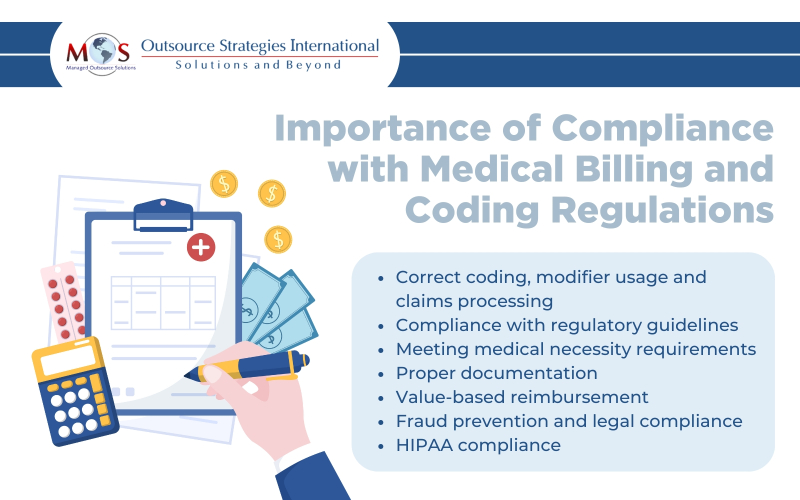Medical billing and coding regulations play a critical role in determining reimbursement in healthcare organizations by ensuring that services provided are accurately documented, billed, and compliant with payer guidelines. Complying with industry regulations if easier for practices that partner with a medical revenue cycle management company. Such companies have teams of experienced professionals who are familiar with coding and billing regulations. They accurately code patient records and submit claims for payment, helping to reduce errors and fraud, while also ensuring that healthcare providers are reimbursed accurately for their services.
Ensure Compliance, Maximize Your Revenue!
This post discusses the regulations surrounding medical billing and coding and how they impact healthcare reimbursement process.
Key Medical Billing and Coding Regulations that Impact Cash Flow
Healthcare organizations must navigate a complex landscape of regulations governing medical billing and coding. Adhering to these regulations supports appropriate reimbursement, prevent fraud and abuse, and delivery of quality patient care. There are various regulations that detail the impact of medical billing on reimbursement:
Coding Rules
Adhering to CPT and ICD-10 coding guidelines and standards is essential to inform insurance companies about healthcare services rendered.
Developed by the American Medical Association (AMA), CPT codes play a vital role in accurate medical documentation, billing, and reimbursement, enabling seamless communication between healthcare providers and payers.
The ICD coding system standardizes the classification of diagnoses, symptoms, and procedures. These guidelines ensure consistency and precision in medical records, supporting effective communication, data analysis, and reimbursement processes across healthcare systems.
Understanding the different types of codes and modifiers is essential to accurately document and bill for medical services. Proper claim submission requires using the appropriate CPT codes with corresponding ICD-10 codes to reflect services delivered. Incorrect coding can result in denied claims or reduced payments.
Knowing bundling rules is necessary to ensure accurate medical billing. Bundling involves using a CPT code to describe multiple procedures that were performed at the same time or during a single episode of care. Bundling is used for procedures that are related and performed during the same appointment. Providers are rewarded for coordinating care, preventing complications and errors, and reducing unnecessary or duplicative tests and treatments.
Unbundling occurs when two services are billed separately instead of using a single comprehensive code, leading to overbilling. However, unbundling can be appropriate when additional time or skill is required. In such cases, modifiers are used to justify billing separate services.
Following proper coding practices helps maintain the integrity of billing processes and maximize reimbursement. When healthcare providers underbill, they miss out on revenue for the services they’ve performed. On the flip side, when a provider charges for a higher level of service than was actually delivered, it increases risk of audits and penalties.

HIPAA Regulations
The Health Insurance Portability and Accountability Act (HIPAA) establishes national standards for the protection of patient health information, including personal details, diagnoses, treatments, and insurance information. HIPAA regulations impact provider reimbursement in various ways:
- Privacy compliance: If a healthcare provider fails to comply with HIPAA, it can lead to fines and penalties that affect their financial standing and reimbursement processes.
- Coding compliance: HIPAA requires healthcare providers to use standardized code sets, such as ICD-10 and CPT.
- Legal compliance: Adhering to HIPAA regulations is important for healthcare organizations to avoid legal and financial penalties. The Department of Health and Human Services (HHS) can impose a fine of up to $1.5 million per year for each violation of HIPAA.
Partnering with a HIPAA compliant medical billing company can enhance your credibility as a healthcare provider, reduce administrative errors, and ensure smoother interactions with payers, leading to more accurate and timely reimbursements.
Reimbursement Models
- Shift to Value-Based Care: The shift towards value-based care focuses on quality over quantity. The Affordable Care Act (ACA) introduced reforms that require transparency in pricing and coverage. It also mandates that healthcare providers implement ethics and compliance programs to receive reimbursement for federally funded patients.
- Bundled Payment Models: Regulations encourage bundled payment models, where providers receive a single payment for all services related to a treatment episode. Here are some ways bundled payment models impact reimbursement:
- Set price: A set price is used for the episode of care, which is usually based on historical costs.
- Financial risk: Providers in the bundled payment model take on some financial risk, but it’s lower than in other payment models. If the cost of care is less than the agreed price, providers keep the extra money. However, if costs exceed that price, they must cover the difference.
Fraud and Abuse Laws
Important Federal fraud and abuse laws that apply to physicians are the False Claims Act (FCA), the Anti-Kickback Statute (AKS), the Physician Self-Referral Law (Stark law). Violating these laws knowingly or inadvertently could result in criminal penalties, civil fines, exclusion from the Federal health care programs, or loss of medical license. These rules impact reimbursement by:
- Supporting accurate billing: Providers must bill accurately for the services they provide. If they overcharge or bill for services not rendered, they risk losing reimbursement or facing penalties.
- Driving compliance: Providers must follow specific guidelines to ensure their billing practices are compliant. If they fail to do so, they may face audits, which can lead to denied claims and lost payments.
- Preventing fraud: Providers found engaging in fraudulent activities can be excluded from receiving payments, significantly impacting their revenue.
CMS Billing Regulations
For medical billing and reimbursement under Medicare and Medicaid, providers must stay up-to-date with evolving regulations of these government programs. Specific billing and reimbursement regulations that medical providers must adhere to in order to receive payment for services rendered include:
- Coding: The National Correct Coding Initiative (NCCI) ensures correct coding and prevents improper payment in Medicare Part B claims.
- Medically Necessary Services: Medicare reimburses only medically necessary services, meaning they must be appropriate for diagnosing or treating a condition.
- Pre-Authorization and Approval: Medicare Advantage Plans (Part C) may require pre-authorization for certain services, such as surgeries or DME.
- Reimbursement Methodologies: Medicare uses the Prospective Payment System (PPS), Bundled Payments, and Resource-Based Relative Value Scale (RBRVS). Local and National Coverage Determinations (LCDs, NCDs) to guide reimbursement based on medical necessity and evidence.
- Timely Filing: Both Medicare and Medicaid have strict filing deadlines, with Medicare requiring claims within 12 months of service.
Compliance with these guidelines is critical for ensuring timely and accurate payments and avoiding costly mistakes and comply with anti-fraud regulations.
Documentation Guidelines
For every test and/or service rendered, the provider must document the service, diagnosis, sign, symptom, disease, and/or ICD code. Claims should be submitted with timely, legible, and complete documentation, ensuring a clear and accurate representation of the patient’s health, and provided in a way that justifies the assigned diagnosis and procedure codes.
Simplify Your Billing Process and Maximize Cash Flow!

Expertise can make the Difference
Medical billing and coding regulations play a crucial role in ensuring accurate reimbursement for healthcare organizations. By adhering to guidelines like proper coding, medical necessity, and timely filing, organizations can avoid claim denials, reduce the risk of fraud, and ensure they receive the payments they’re entitled to. Staying up-to-date with Medicare and Medicaid requirements is key to maximizing reimbursement and maintaining financial health in a constantly evolving regulatory landscape.
Outsourced medical billing can help healthcare organizations navigate these complex regulations and optimize revenue. Experts stay informed about changing billing and coding guidelines, perform regular audits to check for errors or inconsistencies in coding and billing practices, and help providers establish clear coding policies that align with industry standards and legal requirements. Having specialized knowledge or skill can ensure proper medical billing and timely and appropriate payments.





